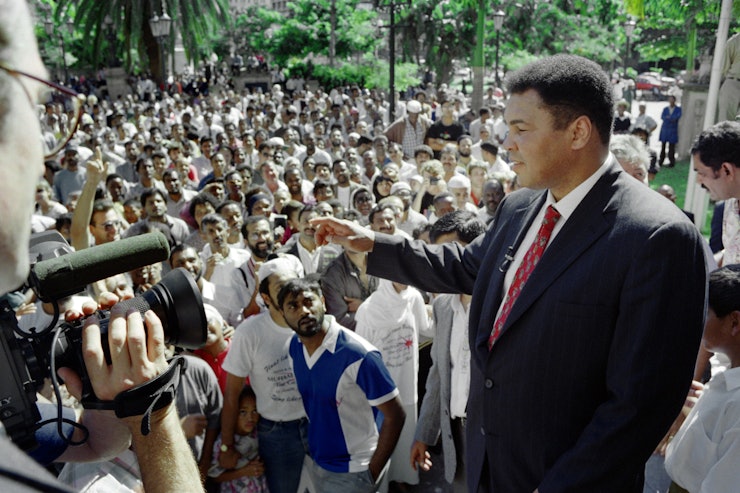Why Did Muhammad Ali Convert To Islam? The Legendary Boxer's Beliefs Were Important To Him

Source:
WALTER DHLADHLA/AFP/Getty Images
Ali originally became interested in religion after he pledged allegiance to the Nation of Islam in 1964, a completely different animal to Islam and a religious organization that according to Ali's biographer, Jack Cashill was preaching "segregation, [fantasizing] about genocide, and [horrifying] the serious civil-rights liberals of that era, black and white." It was a life-changing decision: The boxer, who was then known as Cassius Clay, was given a new name. Ali said at the time, according to The Independent, "I am Muhammad Ali, a free name — it means beloved of God, and I insist people use it when people speak to me"; he also referred to his old moniker as a "slave name." It wasn't until 1975 that Ali converted to the much more mainstream Sunni Islam.

Source:
Stephen Cohen/Getty Images Entertainment/Getty Images
My conscience won’t let me go shoot my brother,
or some darker people, or some poor hungry people in the mud for big
powerful America. And shoot them for what? They never called me nigger,
they never lynched me, they didn’t put no dogs on me, they didn’t rob me
of my nationality, rape and kill my mother and father… Shoot them for
what? …How can I shoot them poor people, just take me to jail.
According to a VOA News article, Ali wrote about this time in a 2004 biography. "The Nation of Islam taught that white people were devils. I don't believe that now; in fact, I never really believed that. But when I was young, I had seen and heard so many horrible stories about the white man that this made me stop and listen."

Source:
WALTER DHLADHLA/AFP/Getty Images
My dad feels guilty when he doesn't get to pray
five times a day. Sometimes it's more difficult for him to actually get
down and pray. When the Parkinson's accelerated, he stopped getting up
at 5 a.m. to pray.
Hana also explained the causes for his final conversion in his life, to Sufi Islam in 2005:
My father has a collection of books by a man
named Hazrat Inayat Khan. They're Sufi teachings. He read them front to
cover. They're old and yellow and the pages are torn. They're amazing.
He always says they're the best books in the world.
My father is very spiritual-more spiritual now than he is religious. It was important for him to be very religious and take the stands he did in earlier years. It was a different time. He still tries to convert people to Islam, but it's not the same. His health and his spirituality have changed, and it's not so much about being religious, but about going out and making people happy, doing charity, and supporting people and causes.
Perhaps one of the most inspiring things about Ali was his ability to
confront himself and question his own beliefs: His spiritual journey is
just proof that he never stopped challenging himself and reformulating
what he believed in to reflect his growth. No matter what belief or lack
thereof we possess, it's inspiring to think of a man who channeled his
beliefs into external good for the world: charity and happiness for
those who surrounded him.My father is very spiritual-more spiritual now than he is religious. It was important for him to be very religious and take the stands he did in earlier years. It was a different time. He still tries to convert people to Islam, but it's not the same. His health and his spirituality have changed, and it's not so much about being religious, but about going out and making people happy, doing charity, and supporting people and causes.
Source : BUSTLE
No comments:
Post a Comment
Thanks for your comments, I will reply soon.